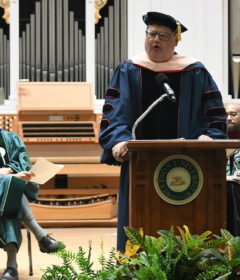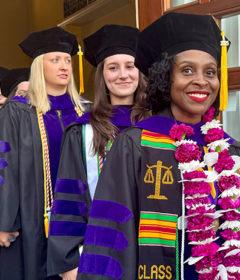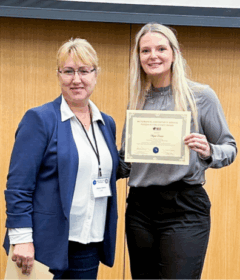Graduate Programs: Higher Degree of Attention


Stetson’s newest graduate program, “88 Tuesdays,” is up and running.
Or, it can be stated, it’s now counting down.
However, you won’t find any mention of that name in the university’s online catalog of graduate programs. Instead, what you will find is the newly minted Master of Science in Higher Education Administration and Supervision, created by Lou L. Sabina, PhD, associate professor and chair for Graduate Education Studies.
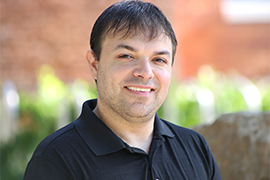
Nonetheless, the program launched this fall — labeled “88 Tuesdays.”
“‘Eighty-eight Tuesdays’ is how I’m marketing it for our recruiting sessions,” says Sabina, noting that the two-year, in-person program will hold its classes 6-10 p.m. on 44 Tuesdays each year. That “88 Tuesdays” nickname “gives you a number to count down to. It’s better than saying ‘every Tuesday for two years.’”
Also new this fall has been a face-to-face component added to Stetson’s Master of Business Administration online program, which is STEM designated. That designation practically allows international students to work in the United States longer after graduation compared to a non-STEM program. Plus, a new Accelerated Bachelor’s to Accelerated MBA program launched this fall. Both serve as further evidence that the university is amping up its graduate programs to meet evolving community needs.
In essence, the two entirely new programs, along with the in-person program addition to the MBA, seek to expand opportunities not just for mid-career professionals and new graduates, but undergraduates as well.
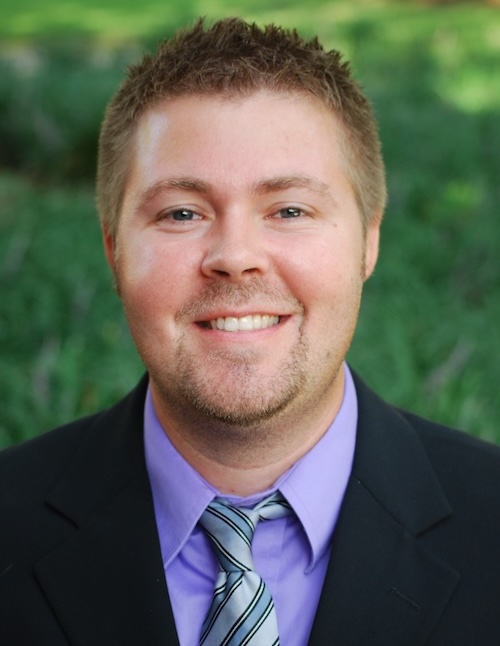
The result: Graduate programs have gained an enhanced emphasis at Stetson.
‘Good Time to Expand’
“You can see the potential growth opportunity within graduate programs,” says Brandon Speith, director of Graduate Admissions. “Obviously, we can still serve the students from Stetson’s undergraduate program who want to pursue a master’s, but there are plenty of working professionals interested in a master’s. We think it’s a good time to expand our programs and look at what other programs we can offer if we see a need in the community.”
The university’s greater emphasis on graduate programs is a natural one, according to Ken Lundy, assistant director of Graduate Admissions for the College of Arts and Sciences. “It’s really just a response to the growing need of the population surrounding us, the needs of the students,” Lundy says.
“Although undergraduate enrollment on the national level has been declining, there has been a slight increase or at least a steady consistency of individuals looking to enroll in graduate programs.”
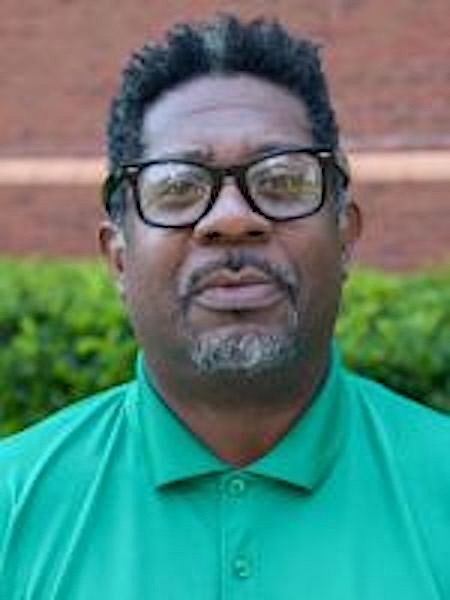
Not counting the Stetson University College of Law, Stetson’s graduate programs include seven in the College of Arts and Sciences: Clinical Mental Health Counseling; Creative Writing (MFA); Educational Leadership; Educational Specialist; Exceptional Student Education; Higher Education Administration and Supervision; and Marriage, Couple and Family Counseling.
In addition, Stetson offers five graduate programs in the School of Business Administration: Accounting, Business Administration, Healthcare Administration + Business Administration, Law + Business Administration, and Pharmacy + Business Administration.
At present, graduate enrollment represents approximately 15% of the DeLand student enrollment.
‘Something Different Here’
Sabina’s creation of the Higher Education Administration and Supervision master’s degree was spurred by the lack of programs across Florida “offering face-to-face delivery of administration and supervision.”
Many of the state’s in-person education programs, Sabina describes, “are basically in student affairs – housing and residence. I wanted something that was administration and supervision focused. I knew we could create something different here and make that work.”
In addition, the program will serve student populations that differ in several ways from other education graduate offerings. Higher Education Administration and Supervision is Stetson’s “first education program where people can enroll straight out of an undergraduate degree to get a graduate degree.”
Along with current undergraduates, potential program participants may include, for example, people “working in grants, media, marketing or web design who are looking to get into higher education.” Sabina says.
As for Stetson’s MBA, while the face-to-face component is new, the program is not. Yes, students now have more options. They can complete their MBA 100% online (as has been the case in the past), pursue their studies through an online/in-person hybrid course or engage entirely through a face-to-face track.

Julia Rentas ’22, assistant director of Graduate Admissions for Business Programs, earned her degree in marketing and sales partly during the COVID-19 pandemic through online study. “There are so many great opportunities out there for students,” she says.
“This widens the opportunity for students to come to Stetson. This enables international students to study at Stetson. Plus, we really do value the intimacy of a small class.”
Meanwhile, Stetson’s new Accelerated Bachelor’s to MBA 4+1 program “will allow our undergraduate students essentially to take the first two MBA courses before they graduate,” Speith points out. “Then basically they only need one year to complete the rest of the MBA.”
Of course, a major selling point for all of Stetson’s business graduate programs is the university’s accreditation by the Association to Advance Collegiate Schools of Business International. Fewer than 6% of business schools worldwide have obtained AACSB accreditation, according to AACSB’s website.
“You are able to gain a degree here at Stetson and feel confident that it can be accepted anywhere in the world,” asserts Speith.
Another selling point is attention, thanks to small class size. “You’re not just a number at Stetson,” says Rentas. “Your professors know who you are.”
Sabina believes such an intimate setting is perhaps Stetson’s No. 1 differentiator from its graduate-school competition.
“Stetson offers individualized assistance to students who need that support,” Sabina concludes. “We have high-quality faculty who are committed to the students, and we have smaller class sizes. Every single professor will take the time to get to know the students.”
For graduate programs at Stetson, that represents a higher degree of attention — all the way around.
-Rick de Yampert

